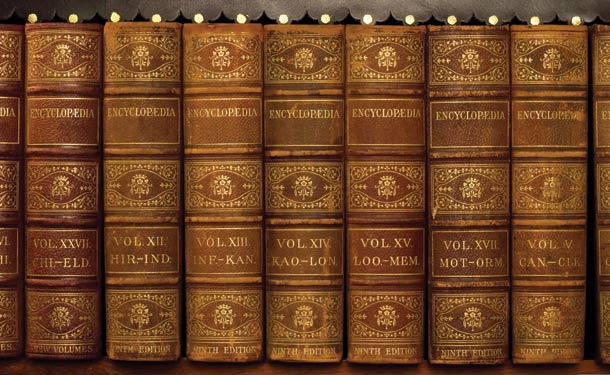Encyclopedias. Remember them? A lot of people don’t, particularly kiddos. Check out a YouTube video titled “Teens React to Encyclopedias.” Presented with several volumes from a set of World Book, the fresh-faced youngsters are at first perplexed. Eventually they sort it out. “It was Google back in the day?” guesses one. “So sad,” says another.
You can forgive these young’uns for missing a deeper observation: There was a time when you could practically size up an American family by the encyclopedia displayed in its living room. Collier’s, Book of Knowledge, Encyclopedia Americana — each had an audience. A full set of Britannica meant your family was well-heeled and probably brainy. World Book meant you were maybe less of those things. In any case, if your family had class, or aspirations of class, you probably owned an encyclopedia. It represented standing in society.
Of course, it’s no secret that generations of students managed to stumble through school by cribbing their papers from encyclopedia entries. I’m not talking about you, of course — you’d never plagiarize — but you knew classmates who did, right? It was just the way it was.
And then, seemingly in an instant, everything changed. The pace of technology quickened. Businesses that had long cruised began to founder. Anyone recall a company named Keuffel and Esser? One day it was the leading maker of slide rules, and the next day came handheld scientific calculators — and, well, you know how that story ended. A couple of decades ago, encyclopedias were lashed by that same tech storm.
Today, World Book is the last man standing. Britannica, once the undisputed king of general-interest encyclopedias, gave up on print five years ago (although you can still subscribe online). “I think it’s like a very old actress or actor that tried to hold to their youth. It just doesn’t work,” Britannica’s president said at the time in explaining his decision to shutter the books.
Wikipedia.com, which was conceived as an internet-only service, delivered the knockout blow to Britannica. The free, reader-written encyclopedia currently features more than five million articles (versus about 17,000 in the most recent print version of World Book). It has crushed nearly everything in its path.
Except, as noted, World Book. It has managed to survive mainly because schools and public libraries believe they should stock a set of encyclopedia for young readers. But why?
“I suspect the most compelling reason is the desire to have accurate, authoritative material in a permanent form,” Paul Kobasa, World Book’s editor in chief, told me recently.
Kobasa wouldn’t disclose how many sets are sold, but said “it’s in the thousands” annually and running pretty steady. Obviously, World Book can’t keep up with every breakthrough in science or breakup in celebrityville, nor does it wish to. Still, Kobasa said that his editorial team “touches 25 to 30 percent of the pages every year.”
Some things I’ll bet you don’t know about World Book: An entire set weighs in at around 65 pounds. “Painting” and “Fish” are always among its longest articles, at about 60 pages each. Next year’s iconic Spinescape image will go radical, featuring a robot. These days, World Book runs $1,199.95 for the luxe version (somewhat less for the plain binding). Unfortunately, past editions are practically worthless, which is a shame, as they were so beautifully produced. (On the other hand, vintage Britannicas retain modest value, and if you happen to own a full set of the 1911 edition — prized as “the grandaddy of all encyclopedias” — some collectors will pay upwards of $3,000 for that.)
Can World Book continue to thrive in its present form? Kobasa believes it can. He’s not at all defensive about his old-school books of knowledge. “Writing such content in a digestible way,” he told me, “is a service, not an insult.”
In the last issue, Neuhaus wrote about honing your TV skills.
See the recent Post story “Death of a Sales Scheme: Encylopedia Shysters of the Door-to-Door Age.”
Become a Saturday Evening Post member and enjoy unlimited access. Subscribe now




Comments
“In any case, if your family had class, or aspirations of class, you probably owned an encyclopedia. It represented standing in society.”
No.
It meant you were interested in and concerned about education. SEP does a real disservice by trivializing and trying to force this into a status/elite box.
My parents, both schoolteachers, both worked second jobs to make ends meet for a family of five. (So much for “standing in society.”) Buying the WORLD BOOK was a major expense. (They had really wanted the BRITANNICA, whose entries throughout its history were often written by major experts in their fields, e.g., the 1911 edition mentioned, but could not afford it.) WORLD BOOK and the monthly NATIONAL GEOGRAPHIC were invaluable contributors to our (my siblings and mine) curiosity and thirst for knowledge growing up, and we are eternally grateful to our parents’ desires and efforts to expand our intellectual and creative horizons.
I am very glad WORLD BOOK continues in print. Physicality is important. WORLD BOOK and Wikipedia in its best moments (I’m a sustaining donor and editor/contributor) are a timely, timeless, and important preliminary resource, providing entry to so many levels and kinds of inquiry.
Today, Google Knowledge is secondary to “hand held games” amongst children and teenagers, excessive mobile telephone use is a plague everywhere, used books are being dumped by the billion tons annually, newspaper reading is virtually nonexistent, Yellow Pages and all manner of business directories is totally dead and TV commercial sales messages are being zapped by the mute-button. The Microsoft age could well be a disaster for the future?
It’s a pity you didn’t mention World Book Online, which continues to expand and has no space or weight limitations. It’s produced by the same editors as the print edition, so the quality is excellent. Individual subscriptions are modest, in the $50 per year range, I think.